As an electric car owner, one of the most common questions I get asked is how long it takes to charge my car. The answer depends on a few factors, including the charging speed and the size of the car’s battery. In this quick guide, I’ll provide you with an estimate of the charging times for a 7kW charging point.
A typical electric car with a 60kWh battery takes just under 8 hours to charge from empty to full with a 7kW charging point. However, most electric car drivers don’t wait for a full recharge and instead choose to top up their charges. The larger the car’s battery and the slower the charging point, the longer it will take to charge.
Now let’s dive into the factors that can affect the charging speed of an electric car:
Key Takeaways:
- A typical electric car with a 60kWh battery takes just under 8 hours to charge from empty to full with a 7kW charging point.
- The larger the car’s battery and the slower the charging point, the longer it will take to charge.
- Factors such as the size and state of the battery, maximum charging rate of the car and the charging point, and environmental factors can impact charging speed.
- Charging an electric car at home with a 7kW charger is convenient and cost-effective.
- Charging at public stations can vary in duration depending on the type of charger used.
Charging an electric car is a process that requires planning and understanding of the charging speed. By considering factors such as battery size, charging speed, and charger type, you can estimate how long it will take to charge your electric car. Stay tuned for the next sections where I’ll provide more detailed information about factors that affect charging speed, charging times at home, charging times at public stations, and charging times for different charger types.
Factors that Affect Charging Speed
When it comes to charging an electric car, several factors come into play that can affect the charging speed. Understanding these factors can help electric car owners optimize their charging times and plan their journeys more efficiently.
- Battery Size: The size of the battery is one of the most significant factors that influence charging speed. Larger batteries will naturally take longer to charge compared to smaller ones.
- Battery State: The state of the battery also plays a role in charging time. Charging from empty to full will take longer than topping up the battery from a partially charged state. So, it’s faster to charge a car from 20% to 80% compared to charging from 0% to 100%.
- Maximum Charging Rate: Both the vehicle and the charging point have a maximum charging rate. The charging speed depends on the lower of the two rates. So, if a car has a higher maximum charging rate than the charging point, it will still charge at the slower rate.
- Environmental Factors: Environmental conditions, such as ambient temperature, can impact charging efficiency. Cold weather, for example, can slow down the charging process and reduce the overall range of the vehicle.
“The size of the battery, its state, the maximum charging rate, and environmental factors all contribute to the overall charging speed of an electric car.”
By considering these factors, electric car owners can better understand the charging time required for their vehicles and make informed decisions about when and where to charge.
Example of Charging Speed Factors
| Battery Size | Battery State | Maximum Charging Rate | Environmental Factors |
|---|---|---|---|
| 60 kWh | 0% to 100% | 7 kW | Cold weather |
| 30 kWh | 20% to 80% | 22 kW | Moderate weather |
| 90 kWh | 50% to 75% | 50 kW | Hot weather |
As illustrated in the example above, a larger battery size, charging from empty to full, a slower maximum charging rate, and cold weather conditions will result in longer charging times.
Next, we will explore the specific charging times for electric cars when charging at home.
Charging Times at Home
Charging an electric car at home is a convenient and cost-effective solution. With a 7kW home charger, which is commonly used in residential settings, you can fully charge a typical 60kWh electric car battery in just under 8 hours. This makes it an ideal timeframe for overnight charging while you sleep.
A slower home charger with a rating of 3.7kW would take around 16 hours to achieve the same charging level. However, it’s important to note that a 3.7kW charger may not be suitable for all electric car models, as some require a higher charging speed.
If you’re considering a faster home charger, there are 22kW options available. However, it’s worth mentioning that these chargers require three-phase power, which is not commonly found in residential properties. Additionally, implementing three-phase power can be expensive.
It’s important to choose a home charger that suits your specific needs and the capabilities of your electric car. However, a 7kW home charger is a popular and practical choice for many electric car owners, providing a balance between charging speed and cost.
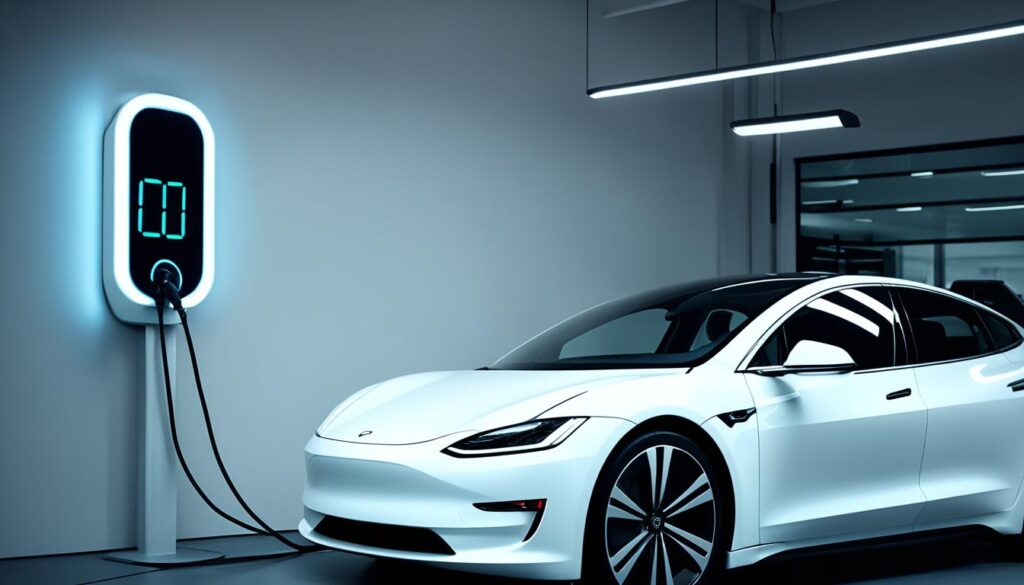
| Charger Type | Charging Speed | Time to Fully Charge a 60kWh Battery |
|---|---|---|
| 3.7kW Home Charger | Slow | Around 16 hours |
| 7kW Home Charger | Medium | Just under 8 hours |
| 22kW Home Charger | Fast | Depends on three-phase power availability |
Charging Times at Public Stations
Charging an electric car in public can vary in duration depending on the type of charger used. Let’s explore the different charging speeds available at public stations:
Slow or AC Chargers
Slow chargers, often rated from 7kW to 22kW, are considered long-stay chargers. These chargers can take a few hours to fully charge an electric vehicle (EV). The exact charging time will depend on factors such as the battery size and initial charge level.
Fast or DC Chargers
Fast chargers, with speeds ranging from 50kW to 350kW, provide a significantly faster charging experience. Depending on the battery size and initial charge level, these chargers can fully charge an EV in as little as 20 minutes to an hour.
Ultra-Rapid Chargers
For those looking for the fastest charging experience, ultra-rapid chargers deliver charging speeds of 100kW or more. These chargers can charge certain high-end electric cars in as little as 20-25 minutes, making them ideal for quick top-ups during a road trip or when time is limited.
It’s important to note that the availability of different charger types may vary depending on the location. Public charging networks often provide a mix of charger speeds to accommodate a range of electric vehicles and charging needs.
To give you a better understanding of the charging speeds at public stations, here’s a table comparing the different charger types:
| Charger Type | Charging Speed | Charge Time |
|---|---|---|
| Slow or AC Chargers | 7kW – 22kW | Few hours |
| Fast or DC Chargers | 50kW – 350kW | 20 minutes – 1 hour |
| Ultra-Rapid Chargers | 100kW or more | 20-25 minutes |
With these charging options available at public stations, electric car owners can find a suitable charger to match their desired charging speed and charging time requirements.
Charging Times for Different Charger Types
When it comes to charging an electric car, the type of charger you use can significantly impact the charging time. Let’s take a closer look at the charging times for different charger types.
3-Pin Plug Charging Times
If you opt for the slowest charging option, which is using a 3-pin plug, it can take between 15 to 20 hours to charge your electric car from 20% to 80% capacity. While this charging method is convenient for occasional top-ups, it is not the most efficient for regular charging.
Home Charger Charging Times
A 7kW home charger, commonly installed in residential properties, offers a faster charging option. With a 7kW charger, you can achieve a 20% to 80% charge in approximately 8 to 12 hours. This makes it ideal for overnight charging while you sleep, ensuring your car is ready to go the next day.
Public Charger Charging Times
Charging at public stations requires taking into account the charging speed of the available chargers. Public chargers can range from slow AC chargers (7kW to 22kW) to fast DC chargers (50kW to 350kW) and ultra-rapid chargers (100kW or more).
- Slow AC chargers can take anywhere from a few hours to reach a 20% to 80% charge.
- Fast DC chargers can provide a full charge within 20 minutes to an hour, depending on the battery size and initial charge level.
- Ultra-rapid chargers offer lightning-fast charging, allowing certain high-end electric cars to be fully charged in as little as 20-25 minutes.
It’s important to note that charging times may vary depending on the specific charger and its location.
Rapid Charger Charging Times
Rapid chargers, known for their faster charging speeds, are commonly found at dedicated charging stations. These chargers typically offer a charging time range of 20 to 60 minutes, depending on the battery size and initial charge level.
Ultra-Rapid Charger Charging Times
For the quickest charging option, ultra-rapid chargers are the way to go. These chargers can provide a fast charge in as little as 20-25 minutes, making them extremely convenient for drivers who need a quick charge on the go.
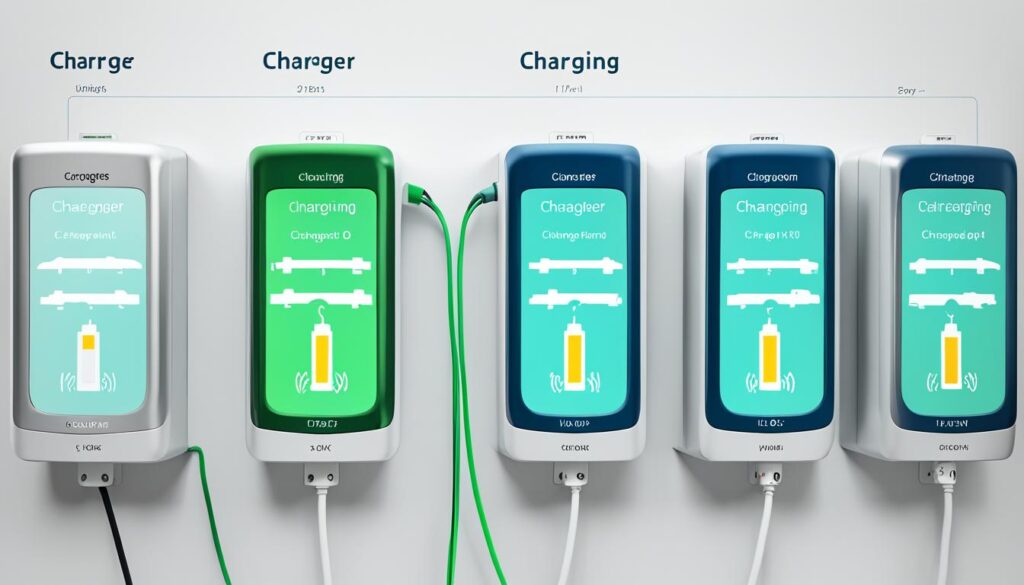
In summary, the charging time for an electric car varies depending on the charger type. While a 3-pin plug offers the slowest charging option, home chargers, public chargers, rapid chargers, and ultra-rapid chargers provide increasingly faster charging times. Understanding the charging times for different charger types can help you make informed decisions about where and how to charge your electric car.
Conclusion
Charging an electric car is a crucial aspect for EV owners, and understanding the charging times is essential. The duration of a charge depends on factors like battery size, charging speed, and the type of charger used. Home charging is the most convenient and cost-effective option, with a 7kW home charger taking approximately 8 hours to fully charge a typical electric car battery. This quick guide to electric car charging highlights the importance of planning ahead and selecting the appropriate charger to minimize charging time and ensure that your EV is efficiently charged.
When it comes to public charging, the duration varies based on the charger type. Fast and ultra-rapid chargers offer quicker charging times, ranging from 20 minutes to 25 minutes, making them more suitable for quick top-ups. On the other hand, slow or AC chargers can take a few hours, while rapid chargers typically provide a full charge in 20-60 minutes. Being aware of the charging times at public stations allows EV owners to effectively manage their charging needs on the go.
This electric car charging guide offers valuable insights into the charging process, enabling EV owners to make informed decisions. By understanding EV charging times and choosing the most efficient charging options, you can ensure that your electric car is always ready for your daily commutes or long journeys, providing a convenient and sustainable mode of transportation.





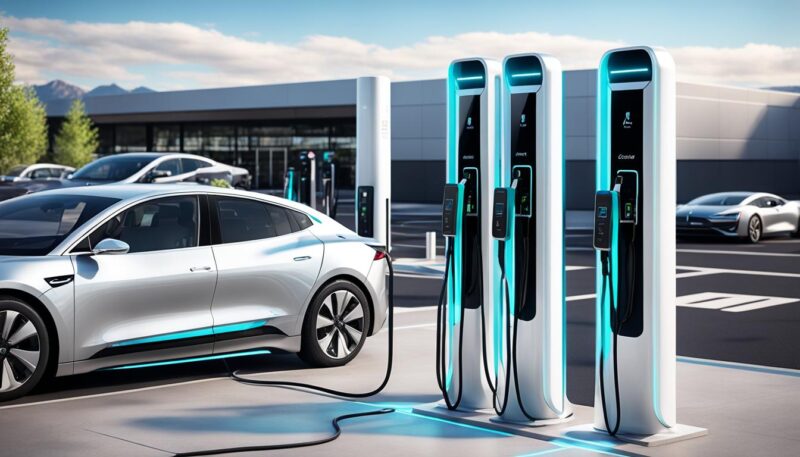
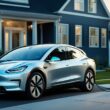
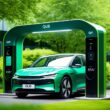
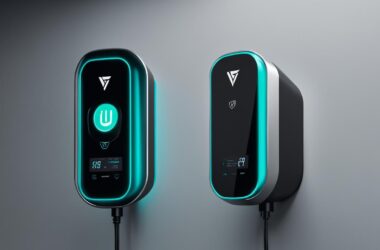

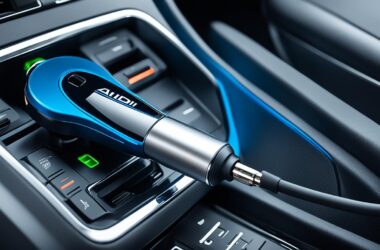
Throughout this great scheme of things you get an A+ just for hard work. Where you actually misplaced me was first on your details. As it is said, details make or break the argument.. And it couldn’t be more true at this point. Having said that, permit me inform you just what did give good results. Your writing is incredibly persuasive which is probably the reason why I am making an effort in order to opine. I do not really make it a regular habit of doing that. Next, whilst I can certainly see the leaps in reason you come up with, I am not confident of exactly how you seem to connect the details which help to make the actual conclusion. For now I will subscribe to your issue however trust in the foreseeable future you actually connect the facts better.
I’m very happy to read this. This is the kind of manual that needs to be given and not the accidental misinformation that is at the other blogs. Appreciate your sharing this best doc.
There is apparently a bunch to identify about this. I think you made certain good points in features also.
I discovered your blog site on google and check a few of your early posts. Continue to keep up the very good operate. I just additional up your RSS feed to my MSN News Reader. Seeking forward to reading more from you later on!…